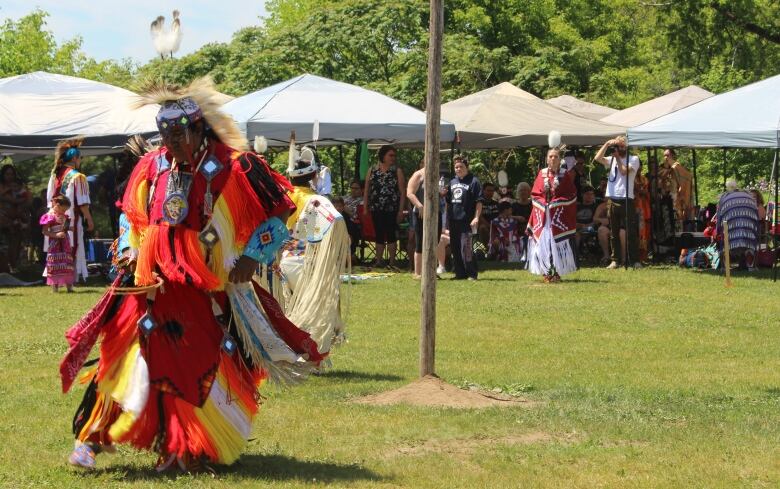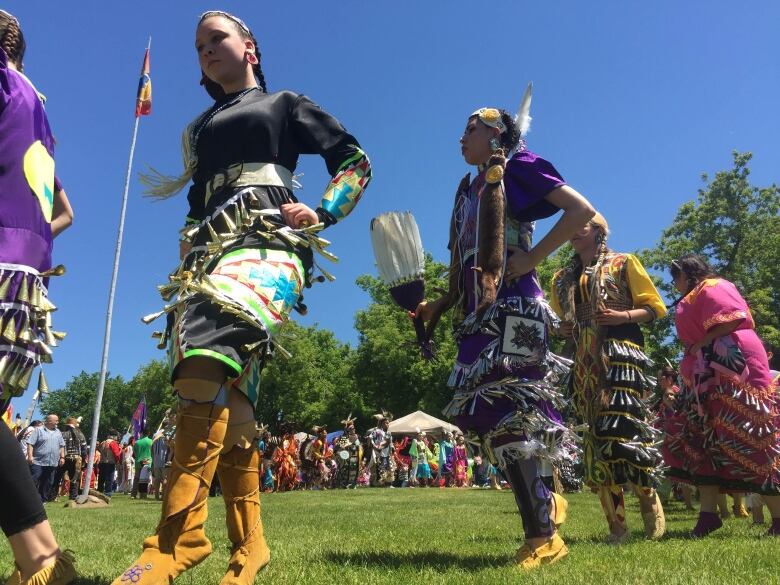After slow 2020, First Nations look forward to the return of powwows this summer
Last year was 'very negative' for Indigenous tourism, says industry group

Seven powwows have been confirmedin New Brunswick for the 2021 season, with the first taking place in Welamakotuk, also called the Oromocto First Nation.
Shawn Sabattis-Atwin, the co-ordinator of the Welamakotuk powwow, said the community is excited to be kicking off festivities this year after a quieter 2020 because of COVID-19 restrictions.
Sabattis-Atwin said the First Nation held a smallpowwowlast year but was not able to invite people from outside the community.
This year, more people can attend, although there will still be some restrictions.
"We're opening up to everybody," said Sabattis-Atwin.
"We're very excited that we're going to be hosting the lieutenant-governor and her partner. And we're also going to be hosting the newly elected first female mayor of Fredericton it's an exciting feeling for us,"
Tourism changes
Powwows are generally the biggest events held in First Nations communities each year.
They canattract thousands of people from both Indigenous and non-Indigenous communities.
Ryan Rogers, the marketing co-ordinator for the Indigenous Tourism Association of Canada, said the return of powwows could be a boonfor First Nations after a lacklustre 2020 tourism season.

Before the pandemic, the growth in Indigenous tourism in Canada was outpacing Canadian tourism activity overall, Rogers said.
"We had 40,000 people employed, 1,700 Indigenous tourism businesses across Canada and contributed $1.9 billion to Canada's GDP. Since the pandemic we have approximately 715 businesses at high risk of permanent closures.
"With the second wave of the pandemic hitting us, we had an additional 500 businesses at high risk of permanent closures I would say the impact on the Indigenous tourism industry has been very negative."
Rogers said an industry created byIndigenous entrepreneurs has popped up around the regional powwowcircuits.
"They're at a point of cultural reclamation and rejuvenation and they're using tourism and they're using powwows as a means to rediscover and share their culture with the world," said Rogers.
"When you go to some of these powwows and you visit the vendors and you try the food and you buy from the artisans, you're supporting Indigenous families and Indigenous communities..
2021 still different
There are some notable changes in the calendar for the powwows this year.
The Neqotkuk (Tobique) and Sitansisk (St.Mary's) powwows, which are normally held in June, have been rescheduled for August and September respectively.
Some powwows, including the one in Listuguj First Nation, have been cancelled.
Still Sabattis-Atwin said he's excited to get out and visit other powwows in the Atlantic region this summer.
"It's nice to get out and see what every other powwowcommittee does," said Sabattis-Atwin.

This all comes ata difficult time for First Nations communities.
The discoveries of hundreds of unmarked graves at former residential schools in British Columbia and Saskatchewan means the powwows are needed more than ever, Rogers said.
"There's no better place to learn about Indigenous history in Canada than at an Indigenous tourism experience," said Rogers.
"And there's no better time than now to celebrate and lift up Indigenous people and Indigenous culture and powwows are a great example of how to do that."
Showing resilience
Sabattis-Atwin said the continuation of powwows shows the resiliency of Indigenous people.
"We are going to honour the lost ones to the residential school," said Sabattis-Atwin.
"When the powwowstarts we are going to have a moment of silence. We are going to honour them, but we want to show people that we, as a First Nations, as an Indigenous community, are resilient and that we are going to honour that."
The Welamakotuk powwowwill take place from July 2 to July 4.












_(720p).jpg)


 OFFICIAL HD MUSIC VIDEO.jpg)
.jpg)



























































































